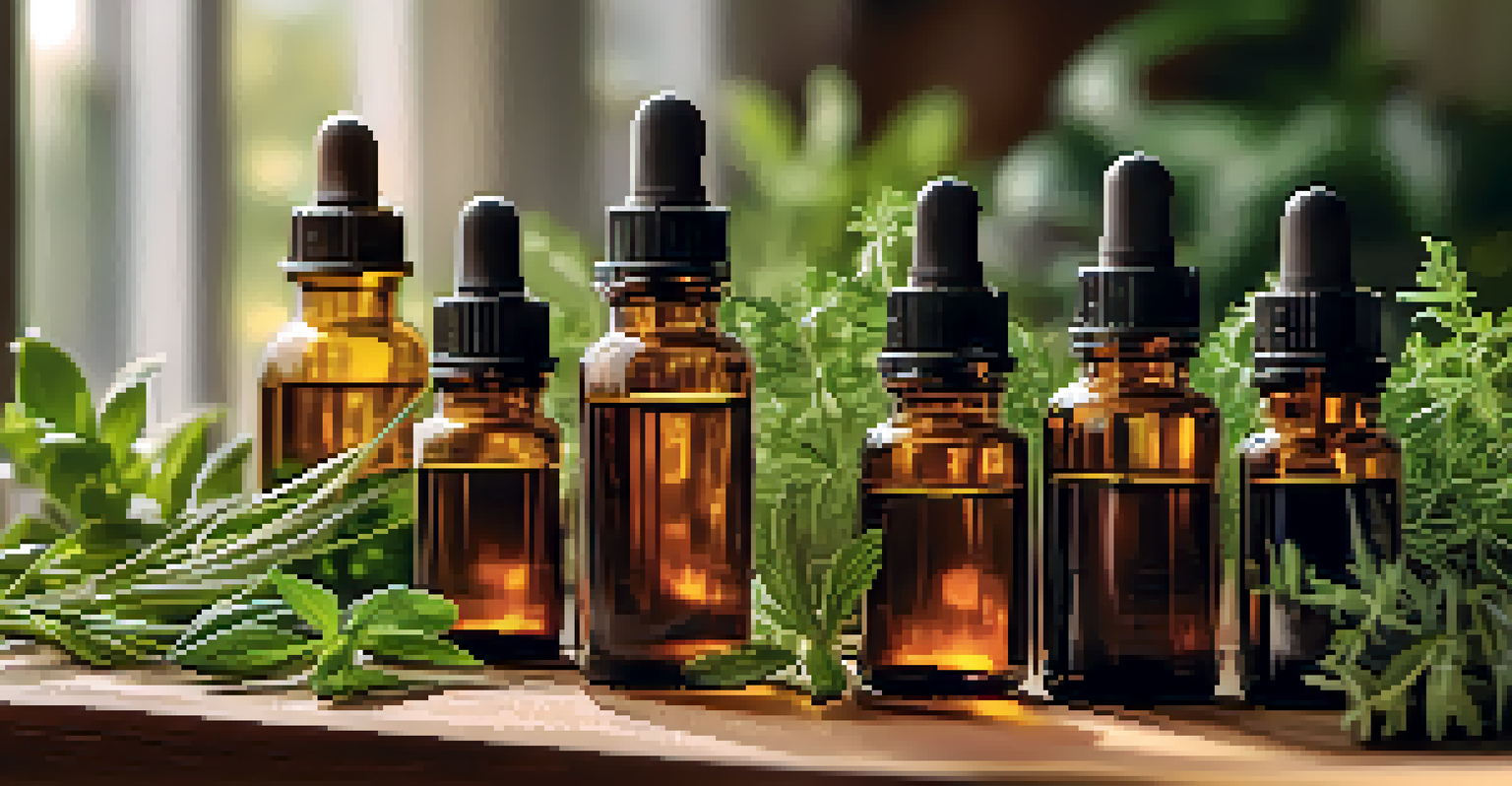The Role of THC and CBD in Managing Anxiety Disorders Effectively

Understanding Anxiety Disorders and Their Impact
Anxiety disorders encompass a range of conditions, including generalized anxiety disorder, panic disorder, and social anxiety. These conditions can significantly affect daily life, making simple tasks feel overwhelming. Understanding how they impact individuals is crucial for effective management and treatment.
Anxiety is not just about feeling nervous; it can be debilitating.
People suffering from anxiety often experience symptoms like excessive worry, restlessness, and even physical manifestations such as increased heart rate. It’s essential to recognize that anxiety is not just about feeling nervous; it can be debilitating. This understanding lays the groundwork for exploring various treatment options.
As we delve into the role of THC and CBD, it’s important to remember that no single solution fits everyone. Each person’s experience with anxiety is unique, and what works for one may not work for another. However, the rising interest in cannabis-derived compounds offers new hope for many.
What Are THC and CBD? A Quick Overview
THC (tetrahydrocannabinol) and CBD (cannabidiol) are two prominent compounds found in the cannabis plant. THC is known for its psychoactive effects, often associated with the 'high' that people experience when consuming marijuana. In contrast, CBD is non-psychoactive, meaning it doesn’t produce a high and is often sought for its therapeutic benefits.

These compounds interact with the body’s endocannabinoid system, which plays a role in regulating various functions, including mood, sleep, and stress response. By influencing this system, both THC and CBD have the potential to impact anxiety levels. Understanding these interactions is key to exploring their roles in anxiety management.
Anxiety Disorders Impact Daily Life
Understanding the debilitating effects of anxiety disorders is crucial for effective management and treatment.
Despite their different effects, both THC and CBD have garnered attention for their potential to alleviate anxiety symptoms. However, it’s essential to approach their use with caution, as individual responses can vary greatly. This variability highlights the need for further research and personalized approaches in treatment.
How THC Can Help Manage Anxiety Symptoms
Many individuals report that THC can help reduce anxiety symptoms, particularly in lower doses. It may promote relaxation and a sense of euphoria, which can be beneficial for those dealing with chronic anxiety. However, it’s crucial to find the right dosage, as higher amounts can sometimes exacerbate anxiety in certain individuals.
The greatest weapon against stress is our ability to choose one thought over another.
THC’s interaction with the brain's endocannabinoid receptors can lead to altered perceptions of stress and anxiety. For some, this can translate into a more manageable emotional state. Anecdotal evidence from users suggests that THC can provide immediate relief, making it an appealing option for those seeking quick solutions.
Nevertheless, potential drawbacks exist, such as the risk of dependency or increased anxiety in some users. This duality reinforces the importance of a cautious approach, ideally under the guidance of a healthcare professional. Understanding the nuances of THC use is critical in developing a safe anxiety management plan.
The Benefits of CBD for Anxiety Management
CBD has gained immense popularity as a natural remedy for various ailments, including anxiety. Unlike THC, it does not produce any psychoactive effects, making it an attractive option for those who want to avoid the high associated with cannabis. Users often report feeling calmer and more balanced after taking CBD.
Research suggests that CBD may interact with serotonin receptors in the brain, which play a crucial role in mood regulation. This interaction can help to alleviate feelings of anxiety and promote a sense of well-being. Many people find that incorporating CBD into their routine leads to a gradual improvement in their anxiety symptoms.
THC and CBD Offer Unique Benefits
Both THC and CBD interact with the body's endocannabinoid system, presenting potential avenues for alleviating anxiety symptoms.
Moreover, CBD is available in various forms, including oils, capsules, and edibles, making it easy to integrate into daily life. This versatility allows individuals to choose the method that works best for them, further enhancing its appeal. As more people turn to CBD, ongoing research will help clarify its potential benefits and optimal usage.
Combining THC and CBD: A Balanced Approach
Some individuals find that combining THC and CBD can create a balanced effect, maximizing the therapeutic benefits while minimizing potential side effects. This synergy, often referred to as the 'entourage effect,' suggests that the compounds work better together than in isolation. This combined effect is an exciting area of study in cannabis research.
Finding the right ratio of THC to CBD can be a personal journey, as different combinations may yield varying results. For example, some people may prefer products with higher CBD content to mitigate the anxiety-inducing effects of THC. Experimentation, guided by professional advice, can help individuals discover the optimal blend for their needs.
As cannabis legalization expands, more products are becoming available that offer specific THC-to-CBD ratios. This allows users to tailor their experience, making it easier to manage anxiety effectively. The potential of this combined approach is encouraging, emphasizing the importance of personalization in treatment.
Potential Risks and Side Effects of THC and CBD
While THC and CBD may offer benefits, it’s essential to be aware of the potential risks and side effects associated with their use. THC can cause short-term memory issues, impaired motor skills, and increased heart rate, especially in higher doses. These effects can be particularly concerning for individuals with anxiety disorders, as they may exacerbate feelings of unease.
On the other hand, CBD is generally well-tolerated, but it can still cause side effects like fatigue, nausea, or changes in appetite. Additionally, CBD may interact with certain medications, making it crucial to consult a healthcare provider before starting any new treatment. Awareness of these potential pitfalls is vital for safe usage.
Professional Guidance is Essential
Collaborating with healthcare providers ensures a tailored and safe approach to using THC and CBD for anxiety management.
Ultimately, a thorough understanding of personal health and underlying conditions is necessary when considering THC and CBD for anxiety management. This knowledge can help individuals make informed decisions about their treatment options, ensuring that they choose the path that aligns best with their health goals.
The Importance of Professional Guidance in Treatment
As promising as THC and CBD may seem, it’s essential to approach their use with professional guidance. Healthcare providers can help patients navigate their options, considering their medical history and current medications. This collaborative approach ensures a safer and more effective treatment plan tailored to individual needs.
Additionally, mental health professionals can provide valuable insights into managing anxiety disorders beyond cannabis. Combining therapy, lifestyle changes, and alternative treatments can create a holistic approach that addresses the root causes of anxiety. This multifaceted strategy often yields better outcomes than relying on one solution alone.

In the end, the journey toward managing anxiety is unique for each person. By working closely with professionals, individuals can explore the potential of THC and CBD while also considering a range of other effective strategies. This informed collaboration fosters a sense of empowerment and control in the face of anxiety.